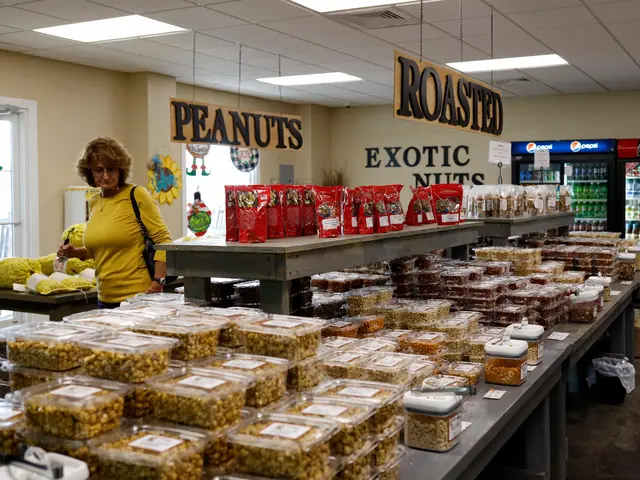The U.S. state of Georgia, which on Friday reopened some non-essential businesses, is among the boldest states in the country to do so, and a number of other states are expected to follow suit despite great concerns over COVID-19.
Georgia Governor Brian Kemp has allowed some non-essential businesses, such as gyms, barbershops, hair salons and tattoo parlors, to reopen their doors from Friday. In-person religious services can also resume this weekend, and restaurant dining rooms, theaters and some other businesses can reopen from Monday, according to the governor's order.
As of Friday night, more than 22,000 people in Georgia have tested positive and about 900 have died from the virus, according to data from Johns Hopkins University. The state has not seen a 14-day downward trajectory in the rate of new confirmed COVID-19 cases, a benchmark set by the White House's reopening guidelines.
Some salon and barbershop owners in the state said there will be no shortage of clients eager to support their businesses, while others said they will not reopen until they feel safe, local media reported.
"We lost graduations, proms and weddings," said David Huynh, a nail salon owner in Savannah. "Already I see stores closing down permanently ... A lot of people don't realize if the nation stays shut down any longer, there will be severe consequences."
Huynh on Friday had 60 appointments scheduled at his nail salon, which has been closed since last month, the Associated Press reported.
In a tweet earlier on Friday, U.S. President Donald Trump reiterated his recent opposition to Georgia's partly reopening, saying "spas, beauty salons, tattoo parlors, barber shops should take a little slower path."
Kemp, a Republican, said earlier this week that his order set out social-distancing and sanitation guidelines meant to balance the need to save lives with the need to save businesses.
However, the state is not the only one struggling to partly and gradually reopen its economy amid the dilemma. Data from Johns Hopkins University showed over 890,000 cases of COVID-19 have been confirmed across the country as of Friday night, with over 51,000 deaths reported.
The Congressional Budget Office said Friday that the unemployment rate around the country, which was near a 50-year low before the coronavirus struck, will surge to 16 percent by September as the economy withers under the impact of the outbreak.
According to an order issued by Texas Governor Greg Abbott last week, retail businesses can offer curbside pickup or delivery to their customers starting Friday, for the first time in weeks. First Colony Mall in Sugar Land announced on its website that some stores and restaurants will open with limited hours or by appointment only; Memorial City Mall in Houston said it will provide contact-free curbside pickup.
Last week in Minnesota, Governor Tim Walz signed an executive order that reopened outdoor recreational businesses, including golf courses, bait shops, public and private marinas and outdoor shooting ranges. The order went into effect on April 18, the same day when New York joined Connecticut and New Jersey in opening up their marinas, boatyards and boat launches for recreational use.
Alaska Governor Mike Dunleavy on Wednesday also issued a health mandate that allows restaurants, stores, personal care services such as hair and nail salons and other non-essential businesses to open from Friday.
In Florida, Governor Ron DeSantis gave some municipalities the green light on April 17 to reopen beaches with restricted hours for walking, biking, hiking, fishing, running, swimming, taking care of pets and surfing. Schools in the southeastern state will remain closed through the end of the academic year, according to a USA Today report.
In Tennessee, restaurants will be allowed to open from April 27 for dine-in service with reduced capacity and retail stores will be permitted to reopen on April 29. Oklahoma and Montana have also issued aggressive plans that will see some businesses and churches open by the start of next week, said the report.
Several states have announced plans to coordinate their response with neighbors: California is moving forward in coordination with Washington and Oregon; governors from New York, New Jersey, Connecticut, Delaware and Rhode Island announced plans to form a joint task force.
California Governor Gavin Newsom on Wednesday made the first modification to the state's stay-at-home order with the resumption of "essential" surgeries, though emphasizing that California was not prepared "to open up large sectors of our society."
However, not all states are pushing the reopening. Pennsylvania Governor Tom Wolf has extended the state's stay-at-home order until May 8, and Maryland Governor Larry Hogan said Friday that Maryland could not be ready until early May to begin phase one of its three-phase recovery process.
"If we try to rush this and if we don't do it in a thoughtful and responsible way, it could cause a rebound of the virus, which could deepen the economic crisis, prolong the fiscal problems and slow our economic recovery," Hogan said.
Atlanta Mayor Keisha Lance Bottoms said in an interview with ABC News on Friday that it was "unacceptable" to have people going out in public and called on residents to remain at home.
"There's nothing essential about going to a bowling alley or getting a manicure in the middle of a pandemic," she said. "I think to make an assumption that we are out of the woods is not based on anything other than a desire to open up businesses. And what I believe is that there are some that are willing to sacrifice lives for the sake of the economy and that is unacceptable to me."
Trump announced guidelines on April 16 for all 50 states to start reopening their economies and is currently pushing to relax the country's shutdown by May 1.
 简体中文
简体中文

